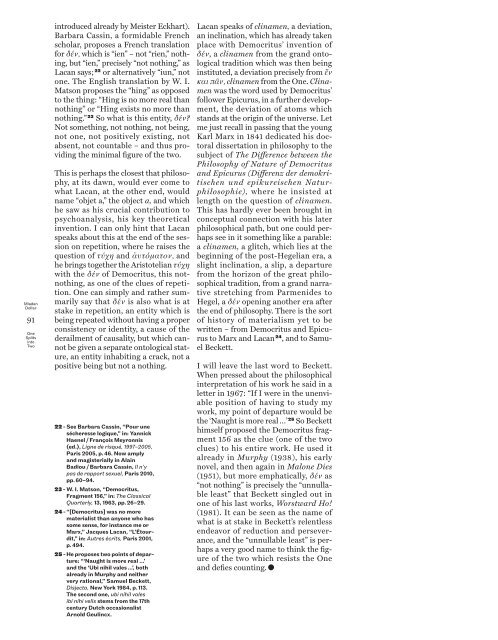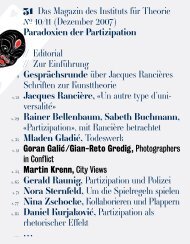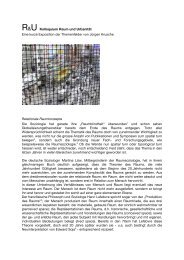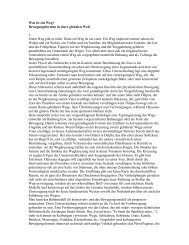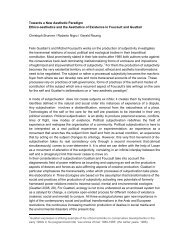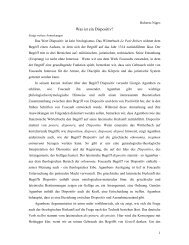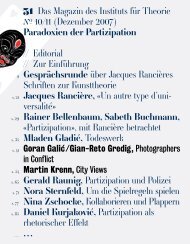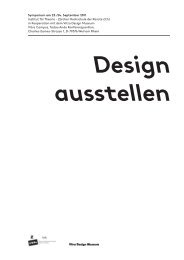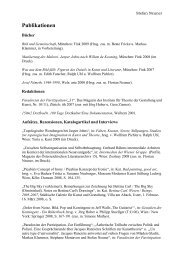Heft - Institut für Theorie ith
Heft - Institut für Theorie ith
Heft - Institut für Theorie ith
Sie wollen auch ein ePaper? Erhöhen Sie die Reichweite Ihrer Titel.
YUMPU macht aus Druck-PDFs automatisch weboptimierte ePaper, die Google liebt.
Mladen<br />
Dollar<br />
91<br />
One<br />
Splits<br />
into<br />
Two<br />
introduced already by Meister Eckhart).<br />
Barbara Cassin, a formidable French<br />
scholar, proposes a French translation<br />
for δέν, which is “ien” – not “rien,” nothing,<br />
but “ien,” precisely “not nothing,” as<br />
Lacan says; 22 or alternatively “iun,” not<br />
one. The English translation by W. I.<br />
Matson proposes the “hing” as opposed<br />
to the thing: “Hing is no more real than<br />
nothing” or “Hing exists no more than<br />
nothing.” 23 So what is this entity, δέν?<br />
Not something, not nothing, not being,<br />
not one, not positively existing, not<br />
absent, not countable – and thus providing<br />
the minimal figure of the two.<br />
This is perhaps the closest that philosophy,<br />
at its dawn, would ever come to<br />
what Lacan, at the other end, would<br />
name “objet a,” the object a, and which<br />
he saw as his crucial contribution to<br />
psychoanalysis, his key theoretical<br />
invention. I can only hint that Lacan<br />
speaks about this at the end of the session<br />
on repetition, where he raises the<br />
question of τύχη and ἀυτόματον, and<br />
he brings together the Aristotelian τύχη<br />
w<strong>ith</strong> the δέν of Democritus, this notnothing,<br />
as one of the clues of repetition.<br />
One can simply and rather summarily<br />
say that δέν is also what is at<br />
stake in repetition, an entity which is<br />
being repeated w<strong>ith</strong>out having a proper<br />
consistency or identity, a cause of the<br />
derailment of causality, but which cannot<br />
be given a separate ontological stature,<br />
an entity inhabiting a crack, not a<br />
positive being but not a nothing.<br />
22 - See Barbara Cassin, “Pour une<br />
sécheresse logique,” in: Yannick<br />
Haenel / François Meyronnis<br />
(ed.), Ligne de risqué, 1997–2005,<br />
Paris 2005, p. 46. Now amply<br />
and magisterially in Alain<br />
Badiou / Barbara Cassin, Il n’y<br />
pas de rapport sexuel, Paris 2010,<br />
pp. 60–94.<br />
23 - W. I. Matson, “Democritus,<br />
Fragment 156,” in: The Classical<br />
Quarterly, 13, 1963, pp. 26–29.<br />
24 - “[Democritus] was no more<br />
materialist than anyone who has<br />
some sense, for instance me or<br />
Marx,” Jacques Lacan, “L’Étour-<br />
dit,” in: Autres écrits, Paris 2001,<br />
p. 494.<br />
25 - He proposes two points of depar -<br />
ture: “‘Naught is more real …’<br />
and the ‘Ubi nihil vales …’, both<br />
already in Murphy and ne<strong>ith</strong>er<br />
very rational,” Samuel Beckett,<br />
Disjecta, New York 1984, p. 113.<br />
The second one, ubi nihil vales<br />
ibi nihi velis stems from the 17th<br />
century Dutch occasionalist<br />
Arnold Geulincx.<br />
Lacan speaks of clinamen, a deviation,<br />
an inclination, which has already taken<br />
place w<strong>ith</strong> Democritus’ invention of<br />
δέν, a clinamen from the grand ontological<br />
tradition which was then being<br />
instituted, a deviation precisely from ἕν<br />
και πᾶν, clinamen from the One. Clinamen<br />
was the word used by Democritus’<br />
follower Epicurus, in a further development,<br />
the deviation of atoms which<br />
stands at the origin of the universe. Let<br />
me just recall in passing that the young<br />
Karl Marx in 1841 dedicated his doctoral<br />
dissertation in philosophy to the<br />
subject of The Di≠erence between the<br />
Philosophy of Nature of Democritus<br />
and Epicurus (Di≠erenz der demokritischen<br />
und epikureischen Naturphilosophie),<br />
where he insisted at<br />
length on the question of clinamen.<br />
This has hardly ever been brought in<br />
conceptual connection w<strong>ith</strong> his later<br />
philosophical path, but one could perhaps<br />
see in it something like a parable:<br />
a clinamen, a glitch, which lies at the<br />
beginning of the post-Hegelian era, a<br />
slight inclination, a slip, a departure<br />
from the horizon of the great philosophical<br />
tradition, from a grand narrative<br />
stretching from Parmenides to<br />
Hegel, a δέν opening another era after<br />
the end of philosophy. There is the sort<br />
of history of materialism yet to be<br />
written – from Democritus and Epicurus<br />
to Marx and Lacan 24 , and to Samuel<br />
Beckett.<br />
I will leave the last word to Beckett.<br />
When pressed about the philosophical<br />
interpretation of his work he said in a<br />
letter in 1967: “If I were in the unenviable<br />
position of having to study my<br />
work, my point of departure would be<br />
the ‘Naught is more real …’ 25 So Beckett<br />
himself proposed the Democritus fragment<br />
156 as the clue (one of the two<br />
clues) to his entire work. He used it<br />
already in Murphy (1938), his early<br />
novel, and then again in Malone Dies<br />
(1951), but more emphatically, δέν as<br />
“not nothing” is precisely the “unnullable<br />
least” that Beckett singled out in<br />
one of his last works, Worstward Ho!<br />
(1981). It can be seen as the name of<br />
what is at stake in Beckett’s relentless<br />
endeavor of reduction and perseverance,<br />
and the “unnullable least” is perhaps<br />
a very good name to think the figure<br />
of the two which resists the One<br />
and defies counting.


